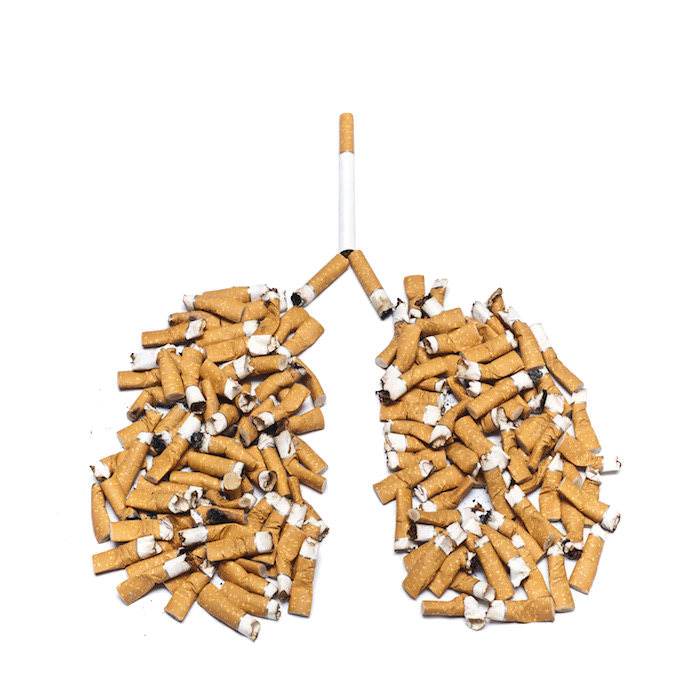

85% of all lung cancer, is non-small cell lung cancer.

Inflammation that never goes away.

Type 2 diabetes exacerbates an already aged body.

Plaque build up damages the lining of your arteries.

Of all cancers, most likely to lead to death.

The slow degrade of air sacks in your lungs.

Forms in the pharynx and requires a trachea.

Forms in the oral cavity and oropharynx.

Risk of bladder cancer is greatest when you smoke. Smokers are at least 3 times as likely to get bladder cancer as nonsmokers.

High risk to those who start smoking before having a child.

Smokers are guaranteed to suffer tooth discoloration.

Causes teeth to fall out, and gums to bleed and deplete.

Smoking not only causes wrinkles on your face but your body.

Pregnant smokers sometimes struggle to gives birth to healthy children.

Slow-growing cancer of the mouth.
Cancer is abnormal cell growth that invades and spreads itself. Cancer comes in every form and affects every region of the body.
https://en.wikipedia.org/wiki/Cancer
https://www.cdc.gov/cancer/index.htm
https://www.cancer.org/cancer.html
Narrow arteries restrict blood flow. There's pressure on the walls of your arteries due to how slim your circulatory system has become. It also makes your heart work harder. Meaning it can cause a series of health issues without even exerting yourself. It can lead to heart attacks, strokes, and aneurysms.
https://www.mayoclinic.org/diseases-conditions/peripheral-artery-disease
https://modernvascular.com/peripheral-artery-disease
https://www.heart.org/en/health-topics/peripheral-artery-disease
Small cell is the most deadly out of all two types of lung cancer (small cell and non-small cell). It spreads quickly, known as metastasizing. The best quality of life is taking lung screenings when recommended. There are several approaches to sustain life longer without side effects that are common ground in chemotherapy.
https://www.cancer.org/cancer/lung-cancer/if-you-have-small-cell-lung-cancer-sclc.html
https://my.clevelandclinic.org/health/diseases/6202-small-cell-lung-cancer
https://www.webmd.com/lung-cancer/small-cell-lung-cancer
Diabetes is the disproportion of blood sugar to what the body needs or needs to shed sugar from the bloodstream. It's known that diabetes affects the kidneys. The kidneys are part of the method to rid your body of toxins hence sugar and water retainment.
https://www.diabetes.org
https://www.cdc.gov/diabetes/basics/diabetes.html
https://www.webmd.com/diabetes/default.htm
Emphysema is the degrading of air sacs in the lungs called alveoli, which are damaged. Meaning that they suffer poor functionality, thinning walls of the sacs, and even ruptures the whole sac. Causing heavy breathes that isn't that efficient.
https://www.mayoclinic.org/diseases-conditions/emphysema
https://my.clevelandclinic.org/health/diseases/9370-emphysema
https://www.lung.org/lung-health-diseases/lung-disease-lookup/emphysema
Non-small cell is the most common type of lung cancer. It is the most treatable type of lung cancer too. The cell replication isn't as fast as small cell lung cancer and responds better to treatments. People's life expectancy is growing as technology meets medicine's ability to fight cancer in methods not imaginable before the COVID pandemic. Getting screened at your recommended schedule is one of the best measures in life quality.
https://www.webmd.com/lung-cancer/non-small-cell-lung-cancer
https://www.cancer.org/cancer/lung-cancer/treating-non-small-cell/by-stage.html
https://en.wikipedia.org/wiki/Non-small-cell_lung_carcinoma
Chronic obstructive pulmonary disease, or COPD, is inflammation in the lungs. The swelling is continuous and ebbs and flows in strength depending on several factors that cause shortness of breath.
https://www.mayoclinic.org/diseases-conditions/copd
https://www.lungs.org
https://www.cdc.gov/copd
Periodontitis is a more severe form of gum disease. It starts as gingivitis. That's inflammation and is affecting the tissues surrounding the teeth. That leads to Periodontitis– red, swollen, depleted gums that can bleed.
https://www.cdc.gov/oralhealth/publications/features/dental-pros-help-your-patients-quit-tobacco.html
https://www.cdc.gov/oralhealth/conditions/periodontal-disease.html
https://en.wikipedia.org/wiki/Periodontal_disease
Breast cancer can happen sooner in premenopausal women than non-smokers. On average, a woman who smokes has an average diagnosis age of 59, instead of 67 years old for non-smokers.
https://www.breastcancer.org/risk/factors/smoking
https://pubmed.ncbi.nlm.nih.gov/23179580/
https://www.breastcancer.org/research-news/20130313-2
© 2024 Cigarette Calculator. All rights reserved.